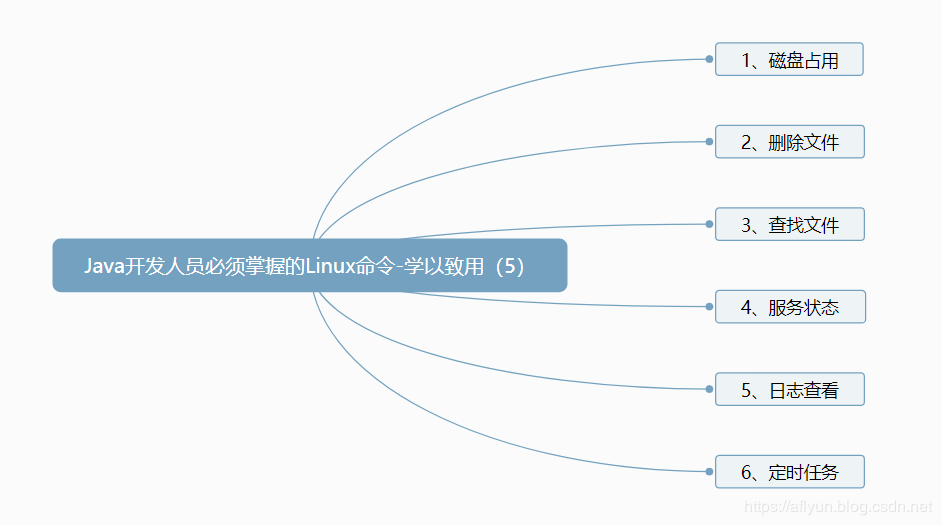Java开发人员必须掌握的Linux命令-学以致用(五)
<font color='blue'>子曰:“工欲善其事,必先利其器。“</font>
做一个积极的人
编码、改bug、提升自己
我有一个乐园,面向编程,春暖花开!
学习应该是快乐的,在这个乐园中我努力让自己能用简洁易懂(搞笑有趣)的表达来讲解让知识或者技术,让学习之旅充满乐趣,这就是写博文的初心。
今天是周末,首先祝大家周末愉快了,分享一张今天早上去外面拍的照片:

图书馆外面的小公园的春意。
这周整理了Linux的命令,也被我称为Linux的魔法。本篇回顾一些命令(魔法),然后通过实际的应用场景,使用这些命令(魔法)。
故事旁白:
在哈利波特的电影中,有许多的魔法咒,比如复制成双:复制咒、使物体消失:消隐无踪咒、使物体归拢一起:收拾咒、移动物体:移形幻影咒、给我指路:定向咒等等。
在Linux的魔法世界中,同样也存在许多命令(魔法)文件复制(cp)魔法、文件移形幻影(mv)魔法、文件归拢一起(tar)魔法、文件消隐无踪(rm)魔法(文件消失无踪魔法使用不当那就堪称 阿瓦达索命)。
魔法地图:

在linux下,“一切皆是文件”!

1、磁盘占用
当服务器运行一段时间后,会有数据的堆积。此时我们用使用 df 魔法去看一下磁盘目前使用的空间情况,如下:
[aflyun@localhost ~]$ df -h 文件系统 容量 已用 可用 已用% 挂载点 /dev/mapper/centos-root 17G 2.0G 16G 12% / devtmpfs 485M 0 485M 0% /dev tmpfs 496M 0 496M 0% /dev/shm tmpfs 496M 6.8M 490M 2% /run tmpfs 496M 0 496M 0% /sys/fs/cgroup /dev/sda1 1014M 129M 886M 13% /boot tmpfs 100M 0 100M 0% /run/user/0
但是当知道了一个挂载的磁盘下面没有空间时候,怎么知道那个目录下面文件占用磁盘空间最多呢?那就使用 du 魔法。如下:
# 查看 /home/aflyun 各个目录占用磁盘空间大小 [aflyun@localhost ~]$ du -lh --max-depth=1 193M ./tools 0 ./magic 193M 各参数说明 : # -h或–human-readable 以K,M,G为单位,提高信息的可读性。 # -l或–count-links 重复计算硬件连接的文件。 # –max-depth=<目录层数> 超过指定层数的目录后,予以忽略。
<font color='red'>应用场景: Linux服务器磁盘空间占用,大文件查找。</font>
2、删除文件
删除(rm)魔法,也就是类似使物体消失:消隐无踪咒。这个魔法如果使用不当那就是 一个黑魔法(如阿瓦达索命)。
正常使用:
[aflyun@localhost rmtest]$ touch testrm1 restrm2 [aflyun@localhost rmtest]$ mkdir -p testrmdir/0317 [aflyun@localhost rmtest]$ mkdir testrmdir1 [aflyun@localhost rmtest]$ cd testrmdir/0317/ [aflyun@localhost 0317]$ touch testrm3 [aflyun@localhost rmtest]$ ll 总用量 0 -rw-rw-r--. 1 aflyun aflyun 0 3月 17 14:48 restrm2 -rw-rw-r--. 1 aflyun aflyun 0 3月 17 14:48 testrm1 drwxrwxr-x. 3 aflyun aflyun 18 3月 17 14:49 testrmdir drwxrwxr-x. 2 aflyun aflyun 6 3月 17 14:50 testrmdir1 [aflyun@localhost rmtest]$ # 1.删除一个文件 [aflyun@localhost rmtest]$ rm testrm1 # 2.删除文件之前询问 [aflyun@localhost rmtest]$ rm -i restrm2 rm:是否删除普通空文件 "restrm2"? # 注: Enter :删除,ctrl +c :退出 # 3.强制递归删除文件或者目录 [aflyun@localhost rmtest]$ rm -f testrmdir rm: 无法删除"testrmdir": 是一个目录 [aflyun@localhost rmtest]$ rm -rf testrmdir [aflyun@localhost rmtest]$ ll 总用量 0 drwxrwxr-x. 1 aflyun aflyun 6 3月 17 14:50 testrmdir1 参数说明: -i 删除前逐一询问确认。 -f 即使原档案属性设为唯读,亦直接删除,无需逐一确认。 -r 将目录及以下之档案亦逐一删除。
使用不当,可能就要跑路喽!:
# 1.直接敲命令删除日志文件
[aflyun@localhost ~]$ rm -rf / home/aflyun/logs/
# 看出什么 端倪了没有。提示一下:一定不要拷贝这条命令去执行!!!
# 如果你真的好奇,那建议在自己的虚拟机上试试,满足一下你的好奇心。
# 这条命令中 “多了个空格 ”!
# 2.脚本中使用,删除日志文件
[aflyun@localhost ~]$ vim cleanlog.sh
cd ${log_path}
rm -rf *
# 进入到日志目录,然后把日志都删除。
# 乍看没有任何问题?但是当目录不存在时,那悲剧也就发生了。

<font color='red'>注意::在生产环境上,执行rm命令的时候,一定擦亮眼睛,否则一回车,就是“千古恨”!</font>
友情建议:
可以在生产环境把 rm -rf 命令替换为mv,再写个定时shell定期清理。模拟了回收站的功能。
参考:rm -rf * 了咋办,跑路吗? http://t.cn/Exyx5f5
3、查找文件
当你忘记文件/目录具体在哪个地方的时候,请使用find魔法。
# 3.1 查找/home/aflyun目录下面的所有文件
[aflyun@localhost ~]$ find /home/aflyun/
/home/aflyun/
/home/aflyun/.bash_logout
/home/aflyun/.bash_profile
/home/aflyun/.bashrc
/home/aflyun/tools
/home/aflyun/tools/apache-tomcat-8.5.38.tar.gz
/home/aflyun/tools/jdk-8u191-linux-x64.tar.gz
/home/aflyun/magic
/home/aflyun/magic/happy.log
/home/aflyun/rmtest
/home/aflyun/rmtest/restrm2
/home/aflyun/rmtest/testrmdir1
# 3.2 查找/home/aflyun 目录中所有大于 10M 的文件并列出来
[aflyun@localhost ~]$ find /home/aflyun -size +5M -exec ls -lh {} /;
-rw-r--r--. 1 root root 9.3M 3月 17 14:35 /home/aflyun/tools/apache-tomcat-8.5.38.tar.gz
-rw-r--r--. 1 root root 183M 3月 17 14:35 /home/aflyun/tools/jdk-8u191-linux-x64.tar.gz
参数说明:
# /home/aflyun 指的是当前目录 你也可以指定目录 /home/happy
# -size 文件大小
# +10M 注意M是大写的 意思大于10M
# -exec ls -lh {} /; 管道 列出来并标明大小
# ls -lh 以 k M G的形式列出来
注: 确保不要在你 Linux 系统的根目录运行该命令,因为这可能导致你的机器 I/O 瓶颈。
# 3.3 查找 /home/aflyun 下面rest 的文件,忽略大小写
[aflyun@localhost ~]$ find /home/aflyun/ -iname rest* -type f
/home/aflyun/rmtest/restrm2
/home/aflyun/rmtest/Restrm
参数说明:
# -i 忽略大小写
# -name 文件名
# 3.4 查找文件或者目录
[aflyun@localhost ~]$ find /home/aflyun -iname rest* -type f
/home/aflyun/rmtest/restrm2
/home/aflyun/rmtest/Restrm
[aflyun@localhost ~]$ find /home/aflyun -iname rest* -type d
/home/aflyun/rmtest/restrmdir1
# 3.5 find和它的朋友exec组合使用,3.2已经用过
# 忽略大小写 ,查找rest开头的文件,并删除文件
[aflyun@localhost ~]$ ll rmtest/
总用量 0
-rw-rw-r--. 1 aflyun aflyun 0 3月 17 15:33 Restrm
-rw-rw-r--. 1 aflyun aflyun 0 3月 17 14:48 restrm2
drwxrwxr-x. 2 aflyun aflyun 6 3月 17 14:50 restrmdir1
[aflyun@localhost ~]$
[aflyun@localhost ~]$ find /home/aflyun -iname rest* -type f -exec rm -f {} /;
[aflyun@localhost ~]$
[aflyun@localhost ~]$ ll rmtest/
总用量 0
drwxrwxr-x. 2 aflyun aflyun 6 3月 17 14:50 restrmdir1
4、服务状态
在服务器上我们一般会允许很多的服务,一般公司会有服务器状态检测机制。那我们通过命令怎么查看服务是否启动,以tomcat为例子。
# 4.1 查看tomcat服务启动状态
[aflyun@localhost bin]$ ps -aux | grep tomcat
aflyun 5142 0.0 0.0 113308 688 pts/0 S 15:41 0:00 /bin/sh /home/aflyun/tools/apache-tomcat-8.5.38/bin/catalina.sh start
aflyun 5143 3.4 8.6 2296124 87748 pts/0 Sl 15:41 0:05 /usr/local/java/jdk1.8.0_191/bin/java -Djava.util.logging.config.file=/home/aflyun/tools/apache-tomcat-8.5.38/conf/logging.properties
.....省略
# 4.1.1 另一种方式看服务状态,输出不是 0 ,代表服务启动状态
[aflyun@localhost bin]$ ps -aux | grep -P "/home/aflyun/tools/apache-tomcat-8.5.38/" | grep -v "/sgrep/s" | wc -l
2
[aflyun@localhost bin]$
注: 服务是启动了,但是不代表服务是正常的。有时候tomcat服务查看是正常的,但是接口无法访问,有假死情况等!
# 4.2 再次启动tomcat遇到8080端口被占用
java.net.BindException: 地址已在使用 (Bind failed)
at java.net.PlainSocketImpl.socketBind(Native Method)
java.net.BindException: Port already in use (Bind failed)
at java.net.PlainSocketImpl.socketBind(Native Method)
# 查看端口8080的使用情况
[aflyun@localhost bin]$ netstat -alnp | grep 8080
(Not all processes could be identified, non-owned process info
will not be shown, you would have to be root to see it all.)
tcp6 0 0 :::8080 :::* LISTEN 5143/java
#查看端口属于哪个程序
lsof -i :8080
[aflyun@localhost bin]$ lsof -i :8080
COMMAND PID USER FD TYPE DEVICE SIZE/OFF NODE NAME
java 5143 aflyun 49u IPv6 40442 0t0 TCP *:webcache (LISTEN)
[aflyun@localhost bin]
# 注: 5143 pid 就是上面查看tomat的pid。
5、日志查看
在工作中,经常会遇到线上项目出现问题,需要排查! 然而在茫茫的日志文件中,如何快速的找到报错的地方的日志,以及快速定位和解决问题,这是一种能力,这种能力是可以在平时工作中锻炼出来的。
# 5.1 查看tomcat的日志,滚动输出
[aflyun@localhost logs]$ tail -f catalina.out
# 5.2 查看tomcat的日志中包含 aflyun 的字符,滚动输出
[aflyun@localhost logs]$ tail -f catalina.out | grep "java编程技术乐园"
# 5.3 查看tomcat的日志中包含 “地址已在使用” 内容的行数
# cat -n 文件名 | grep 搜索名称
[aflyun@localhost logs]$ cat -n catalina.out | grep "地址已在使用"
83 Caused by: java.net.BindException: 地址已在使用
117 Caused by: java.net.BindException: 地址已在使用
145 java.net.BindException: 地址已在使用 (Bind failed)
[aflyun@localhost logs]$
# 5.4 查看tomcat的日志中包含 “地址已在使用” 内容的83行,前后10行日志
# cat -n 文件名|tail -n +起始行数 |head -n +查询多少行数
[aflyun@localhost logs]$ cat -n catalina.out | tail -n +73 | head -n +20
73 at sun.reflect.NativeMethodAccessorImpl.invoke0(Native Method)
74 at sun.reflect.NativeMethodAccessorImpl.invoke(NativeMethodAccessorImpl.java:62)
75 at sun.reflect.DelegatingMethodAccessorImpl.invoke(DelegatingMethodAccessorImpl.java:43)
76 at java.lang.reflect.Method.invoke(Method.java:498)
77 at org.apache.catalina.startup.Bootstrap.load(Bootstrap.java:309)
78 at org.apache.catalina.startup.Bootstrap.main(Bootstrap.java:492)
79 Caused by: org.apache.catalina.LifecycleException: Protocol handler initialization failed
80 at org.apache.catalina.connector.Connector.initInternal(Connector.java:995)
81 at org.apache.catalina.util.LifecycleBase.init(LifecycleBase.java:107)
82 ... 12 more
83 Caused by: java.net.BindException: 地址已在使用
84 at sun.nio.ch.Net.bind0(Native Method)
85 at sun.nio.ch.Net.bind(Net.java:433)
86 at sun.nio.ch.Net.bind(Net.java:425)
87 at sun.nio.ch.ServerSocketChannelImpl.bind(ServerSocketChannelImpl.java:223)
88 at sun.nio.ch.ServerSocketAdaptor.bind(ServerSocketAdaptor.java:74)
89 at org.apache.tomcat.util.net.NioEndpoint.bind(NioEndpoint.java:219)
90 at org.apache.tomcat.util.net.AbstractEndpoint.init(AbstractEndpoint.java:1087)
91 at org.apache.tomcat.util.net.AbstractJsseEndpoint.init(AbstractJsseEndpoint.java:265)
92 at org.apache.coyote.AbstractProtocol.init(AbstractProtocol.java:581)
[aflyun@localhost logs]$
<font color='red'>注: 日志相关的东西很多,这里强调一下,关键的地方一定要打日志,要不出了问题,及时你会各种Linux的魔法,日志中没有输出出现问题的内容(当前的请求参数,响应参数等),你也就是一个“巧妇”,因为巧妇难为无米之炊。日志一定要记录好!否则出了问题就苦恼+浪费很多时间排查!重视每个环节!</font>
6、定时任务
crontab命令常见于 Unix 和 类Unix 的操作系统之中,用于设置周期性被执行的指令。该命令从标准输入设备读取指令,并将其存放于“crontab”文件中,以供之后读取和执行。
crontab 命令的参数:
-e : 执行文字编辑器来设定时程表,内定的文字编辑器是 VI,如果你想用别的文字编辑器, 则请先设定 VISUAL 环境变数来指定使用那个文字编辑器(比如说 setenv VISUAL joe) -r : 删除目前的时程表 -l : 列出目前的时程表
<font color='red'>注: linux crontab 命令,最小的执行时间是一分钟。</font>
# 6.1、写一个脚本,使用crontab 执行,每2s执行一次! [aflyun@localhost crontabtest]$ touch printlog.sh [aflyun@localhost crontabtest]$ touch print.log [aflyun@localhost crontabtest]$ vim printlog.sh [aflyun@localhost crontabtest]$ cat printlog.sh #!/bin/bash ttime=`date +"%Y-%m-%d %H:%M:%S"` echo "$ttime,Welcome to Java编程技术乐园" >>/home/aflyun/crontabtest/print.log #------------------------- # 1.覆盖 echo "" >文件名 # 2.追加 echo "" >>文件名 [aflyun@localhost crontabtest]$ chmod 755 printlog.sh [aflyun@localhost crontabtest]$ ll 总用量 8 -rw-rw-r--. 1 aflyun aflyun 1264 3月 17 16:36 print.log -rwxr-xr-x. 1 aflyun aflyun 132 3月 17 16:34 printlog.sh [aflyun@localhost crontabtest]$ # 6.2、写一个定时的任务 # crontab -e 输入以下语句,然后 :wq 保存退出。保存后可以使用 crontab -l 查看定时任务。 * * * * * /home/aflyun/crontabtest/printlog.sh * * * * * sleep 1 && /home/aflyun/crontabtest/printlog.sh * * * * * sleep 2 && /home/aflyun/crontabtest/printlog.sh ... * * * * * sleep 59 && /home/aflyun/crontabtest/printlog.sh # 6.3 查看打印的日志 [aflyun@localhost crontabtest]$ cat print.log 2019-03-17 16:34:01,Welcome to Java编程技术乐园 2019-03-17 16:34:02,Welcome to Java编程技术乐园 ....
备注:crontab命令 的时程表的格式如下
# f1 f2 f3 f4 f5 program
- f1 是表示分钟,f2 表示小时,f3 表示一个月份中的第几日,f4 表示月份,f5 表示一个星期中的第几天
- program 表示要执行的程序。
- 当 f1 为 时表示每分钟都要执行 program,f2 为 时表示每小时都要执行程序,其馀类推
- 当 f1 为 a-b 时表示从第 a 分钟到第 b 分钟这段时间内要执行,f2 为 a-b 时表示从第 a 到第 b 小时都要执行,其馀类推
- 当 f1 为 /n 时表示每 n 分钟个时间间隔执行一次,f2 为 /n 表示每 n 小时个时间间隔执行一次,其馀类推
- 当 f1 为 a, b, c,... 时表示第 a, b, c,... 分钟要执行,f2 为 a, b, c,... 时表示第 a, b, c...个小时要执行,其馀类推
本文总结
Linux魔法(命令)相关的知识就暂告一段落,如果没有看过前面的系列介绍,在推荐阅读下面查看之前分享的内容,相信仔细学习了这个系列后,很多命令的掌握会有一定的提示,并能应用到实际的工作中!
魔法的修炼之路到这里告一段落,以后有时间会继续分享。欢迎一起学习和积累实用的魔法技能。
推荐阅读
Java开发人员必须掌握的Linux命令(一) Java开发人员必须掌握的Linux命令(二) Java开发人员必须掌握的Linux命令(三) Java开发人员必须掌握的两个Linux魔法工具(四) Java开发人员必须掌握的Linux命令-学以致用(五)
谢谢你的阅读,如果您觉得这篇博文对你有帮助,请点赞或者喜欢,让更多的人看到!祝你每天开心愉快!
<center><font color='red'> Java编程技术乐园 </font>:一个分享编程知识的公众号。跟着园长老司机一起学习,每天进步一点点。</center>
<p/>
<center><font color='blue'>扫描关注,后台回复 【资源】 ,获取珍藏干货! 99.9% 的伙伴都很喜欢</font></center>
<p/>

<center>© 每天都在变得更好的阿飞云</center>
- 本文标签: web shell cat TCP 开发 NIO 2019 apache tomcat grep 时间 操作系统 cache 递归 java node find Bootstrap 参数 mapper bug 目录 端口 tar IDE REST Logging rm -rf * 云 tab 数据 list 删除 tail -f logo unix js UI App http id linux 服务器 https map CTO src 文件系统 root ip centos 空间 总结 IO
- 版权声明: 本文为互联网转载文章,出处已在文章中说明(部分除外)。如果侵权,请联系本站长删除,谢谢。
- 本文海报: 生成海报一 生成海报二











![[HBLOG]公众号](http://www.liuhaihua.cn/img/qrcode_gzh.jpg)

